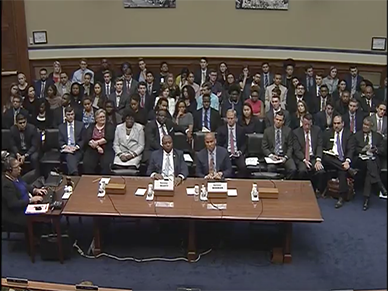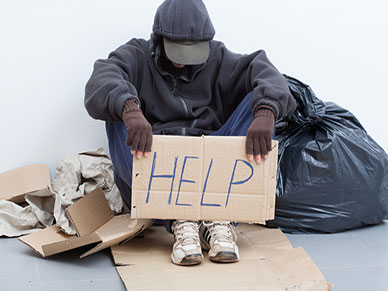
by Georgia Center for Opportunity | Jul 14, 2017
On June 28th, GCO’s Eric Cochling traveled to Washington, D.C. to be part of the Full House Committee on Oversight and Government Reform meeting, which took an in-depth look into “programs and legislation aimed at rehabilitating offenders, facilitating a successful transition from prison to community, and reducing recidivism.”
GCO provided a written testimony to our nation’s leaders but was also instrumental in providing the opportunity for William C. McGahan, Chairman of Georgia Works!, to testify before the committee. If you’re interested in hearing the committee’s conversation, you can view the meeting video online.


by Georgia Center for Opportunity | Jul 10, 2017
By: Randy Hicks and W. Bradford Wilcox
Although young men and women are taking what seems like a dizzying array of paths into adulthood these days, one path stands out as maximizing their shot at the American Dream: what scholars Ron Haskins and Isabel Sawhill have called the “success sequence.” The sequence is a three-pronged formula for success in America: graduate from high school, get a full-time job (or have a partner who does), and then marry before having children. Now, a joint report by the American Enterprise Institute (AEI) and the Institute for Family Studies (IFS) shows this “success sequence” works for Millennials as well.
Released last month, the report tracked how an astounding 97 percent of the oldest Millennials (ages 28-34) who follow this threefold success sequence avoid poverty. In contrast, 53 percent of young adults who didn’t follow the sequence at all are in poverty. Moreover, those who delayed childbearing until after marriage are more likely to not only survive financially, but thrive—finding themselves in the middle or upper third of income earners.
These data hold true regardless of family background, socioeconomic status, or race. Seventy-six percent of African Americans and 81 percent of Hispanic young adults who marry first are in the middle to upper third of income distribution, alongside 87 percent of whites. And 71 percent of Millennials who grew up in households in the bottom third of income distribution but put marriage before the baby carriage had the same economic fortune.
Here’s the message for Millennials—success in America is partly grounded on the three pillars of work, education, and family. But what about young people who struggled with one or more of these steps? Over half of Millennials have already become parents prior to marriage, many remain underemployed, and 53 percent of young adults who have not followed the sequence at all are in poverty.
Closer to home, Atlanta scored horrifically low for social mobility among low-income individuals, according to a joint Harvard and Berkeley study, even though middle-class job growth in Atlanta is strong. In our metro area, poverty rates remain unacceptably high, particularly for minority populations. Even though young adults in the metro Atlanta area are about equally likely to miss steps in the success sequence as their counterparts nationwide, young adults in the state of Georgia are more likely to miss at least one step in the success sequence, compared to young adults in the nation as a whole (46 percent versus 44 percent).
However, for both young and old, this new research isn’t justification for giving up on those who have missed one or more steps on the sequence. Instead, we need to understand that each part of the success sequence can work to help individuals; it’s never too late to get life back on track.
For children caught in multi-generational cycles of poverty, a good education can be a stick in the spokes of the poverty cycle that slows it down; for an adult, it’s a job; and for couples, it may be relationship enrichment programs and other supports. When all three parts of the success sequence work together, however, we begin to see significant results in boosting opportunity for the rising generation.
Many of these solutions must come locally. Mr. Hicks’ organization, the Georgia Center for Opportunity, has been spearheading numerous efforts to bring together local employers, community leaders, schools, churches, and nonprofits to advance vocational training and apprenticeships for workforce development, expand education options for the most vulnerable children, and promote marriage enrichment initiatives to help families flourish.
Here’s the bottom line: While no statistical model can predict an individual’s future success perfectly, we can know what’s more likely to happen. The AEI-IFS report points to what both common sense and experience have already told us: particular paths into adulthood are more likely to give individuals a shot at flourishing than others.
At the same time, it’s crucial to acknowledge that everyone who doesn’t follow the success sequence isn’t destined for failure or disaster. Neither does it suggest that every child born into better conditions is guaranteed success. All the success sequence tells us is what paths are most advantageous for human flourishing.
And it forces us to ask some serious questions: If we care about people, are we not duty-bound to communicate the message of the success sequence, and to do what we can to remove barriers to a quality education, fulfilling work, and a stable family life?
W. Bradford Wilcox is the director of the National Marriage Project at the University of Virginia and a coauthor of The Millennial Success Sequence.

by Georgia Center for Opportunity | May 16, 2017
America was founded on the principle that people should have the opportunity to flourish, to live out their dreams – to be happy. Our country’s forefathers cherished this important truth so much they included it in the United States’ Declaration of Independence. America was designed as a place where all citizens have “certain unalienable Rights, that among these are Life, Liberty and the pursuit of Happiness.”
While people search for satisfaction in life in various ways, employment continues to top the list as a measurement of happiness.
“In America, job satisfaction relates to life satisfaction. Among those who say they are very happy in their lives, 95 percent are also satisfied with their jobs,” writes Arthur Brooks, President of the American Enterprise Institute, in his book The Road to Freedom. “Only 5 percent say they are not satisfied with their work. The evidence also shows that the relationship is causal: job satisfaction actually increases life happiness.”
While not everyone has their dream job, working allows people to achieve something greater than themselves.
In the recently published book The Human Cost of Welfare, authors Phil Harvey and Lisa Conyers address the many reasons why work is so instrumental in fostering happiness. The book’s authors conclude that job achievement is needed for personal worth. Boredom and depression can result from lack of work, and being needed makes people feel valued and important. Depending on others for basic daily living needs decreases self-worth.
At Georgia Center for Opportunity, our goal is to help individuals flourish through productive work. More than half a million Georgians are without work, but desire the opportunity to succeed. Through extensive research and collaboration with community leaders, state lawmakers and businesses, we’ve been able to help improve work opportunities for ex-offenders. We’re also exploring practical options for real reforms to Georgia’s Welfare System, in hopes of motivating recipients to self-sufficiency.
Through collaboration with community partners, area nonprofits, local businesses, and community leaders, GCO has facilitated a series of “Hiring Well, Doing Good” discussions within the Atlanta area. These conversations give local business and organizations an opportunity to connect and share their best-practices for hiring unemployed or underemployed men and women while improving a company’s bottom line.
The evidence remains true even for part-time workers and those not receiving large paychecks. Brooks’ research shows that “[A]dults who worked ten hours a week or more in 2002, 89 percent said they were very satisfied or somewhat satisfied with their jobs. … There is no difference between those with below- and above-average incomes: 89 percent are satisfied.”
It’s quite clear that working is far more valuable than just the paycheck received at the end of the day.

by Georgia Center for Opportunity | Feb 28, 2017
Some things in life are guaranteed: death, taxes, and left-leaning professors in the ivory tower. Proof? The percentage of professors identifying as “far-left” increased from 42 percent in 1990 to 60 percent in 2014, according to UCLA researchers. Another study published last year found that professors who are registered as Democrats outnumber Republicans nearly 12 to 1. At Harvard, 84 percent of the faculty’s political contributions went to Democrats. The College Fix reports that the University of North Carolina-Chapel Hill, 17 departments have no professors registered as Republicans—zero.
As featured recently in the AJC, an Iowa lawmaker proposed legislation that would require universities to balance the number of Republican and Democrat-professing professors that schools hire. A bill so narrowly focused on universities’ employment practices leaves room—as well-intentioned legislation often does—for unintended consequences. Based on the polling above, there may not be enough professors on the right of the political isle to fill such a quota.
Lawmakers in Iowa—and Georgia—should consider a more fundamental issue: Protecting free speech on campus, no matter where you place yourself on the ideological spectrum. Disagree with many people in class? Engage in debate and discover the power of ideas and value of persuasion. So far this year, lawmakers in at least four states are considering resolutions or legislation that protects free speech on campus (Virginia, North Carolina, Florida, and Illinois). The new bills are modeled after Campus Free Speech: A Legislative Proposal by Stanley Kurtz from the Ethics and Public Policy Center and Jim Manley and myself from the Goldwater Institute.
The model legislation takes a comprehensive approach to protecting free expression on public college and university campuses. The bill prevents universities from designating so-called campus “free speech zones,” which actually limit what you can say and where you can say it. The bill allows individuals to speak and act freely on college grounds, as long as they do not interfere with others’ ability to do so. The bill also requires public universities to adopt mission statements in favor of free speech and make sure this material is available to existing and prospective students and faculty. Schools will be required to release an annual report on the condition of free speech on campus.
Colleges should be neutral on the issues and provide space for students and faculty to debate. Once students have left the college bubble, they are destined to encounter people with different opinions. Getting along and working peaceably with—and yes, when the time comes, even amicably disagreeing with—such people is a part of adulthood. No better time to practice these skills than when in college.
by Georgia Center for Opportunity | Sep 26, 2016
Georgia Center for Opportunity hosted the inaugural “Hiring Well, Doing Good” breakfast on September 13th. The event brought together close to 150 business, community and nonprofit leaders to discuss ways to help the chronically un- and under-employed to find work.
We heard from business leaders like Phil Stroud of Tip Top Poultry and Luke Marklin of Uber, who highlighted their companies’ efforts to provide jobs and training to individuals who struggle – for various reasons – to find and maintain steady employment. Phil told the story of an employee who, through a lapse in judgement, spent 10 years in prison – but is now working in a management position for Tip Top, earning $18 an hour for his family.
 Bruce Deel, founder and CEO of City of Refuge, shared about his organization’s success in empowering some of Georgia’s most vulnerable individuals and families to become independent and self-sufficient. City of Refuge will soon graduate its 20th class of culinary students, many of whom are formerly homeless, but are now equipped with the skills to obtain gainful employment in some of our city’s top restaurants. And Frank Fernandez of the Arthur M. Blank Family Foundation inspired us with the creative ways his organization is encouraging construction contractors working at the stadium to hire returning citizens and generate long-term jobs for the unemployed.
Bruce Deel, founder and CEO of City of Refuge, shared about his organization’s success in empowering some of Georgia’s most vulnerable individuals and families to become independent and self-sufficient. City of Refuge will soon graduate its 20th class of culinary students, many of whom are formerly homeless, but are now equipped with the skills to obtain gainful employment in some of our city’s top restaurants. And Frank Fernandez of the Arthur M. Blank Family Foundation inspired us with the creative ways his organization is encouraging construction contractors working at the stadium to hire returning citizens and generate long-term jobs for the unemployed.
We are grateful to Seth Millican and the Georgia Chamber of Commerce for cohosting “Hiring Well, Doing Good.” We were especially encouraged that 100% of survey respondents found the event helpful, 91% left feeling better informed about the chronically un- and under-employed and how to help, and more than 40 connections were made with human service organizations. It was great to see the conversations happening and connections being made both before and after the event, and we’re excited about what develops from this event.
If you’d like to learn more, please visit www.GeorgiaOpportunity.org/Hiring-Well-Resources.

by Georgia Center for Opportunity | Aug 31, 2016
Computational model exposes severe problems with the welfare system
Previously, it was shown how a single mom with two kids in Gwinnett County could lose welfare program benefits by earning more money. This explained why $9 + $1 can equal negative $6,000.
The Gwinnett county example showed only two wage levels. However, the computer model provides results for a large range of wage levels and family structure. This enables policymakers, administrators and interested citizens to see a more complete picture of the challenges facing a family in poverty.
The computer model can generate scenarios in any of the other 158 counties in the state of Georgia.
No matter the county welfare cliffs (that unintended consequence of the current welfare system whereby an individual or family loses by earning more) can be found – essentially trapping families into a level of income.
These cliffs can be clearly seen on the chart below. Wherever there is a drop in a line, there is a loss in benefits that exceed the gain in earned income.
Also clearly seen, the benefit levels are very high and the severity of the cliffs significant. More surprisingly, there is not just one cliff but a series of cliffs that cascade down.
The chart shows that when government benefits are taken into account, it is financially better for a single mom to earn an hourly wage of $9 than an hourly wage three times as much, or $27 per hour.
Of course, it is important to point out that the severity of the cliffs and the income levels where they drop off change depending on the county, the characteristics of the family, and other factors.
These findings underscore the need to undertake fundamental welfare reform beyond the various reforms already being implemented. The system needs to become more rational so not to punish families who try to get ahead by earning more money.
A forthcoming study will highlight other examples.
Chart showing welfare cliff for typical family in Gwinnett County:

How to read the chart: The chart above illustrates the scenario highlighted in this and the prior posts , that is, a single mom with two children in Gwinnett county. The horizontal axis is gross earned income, and the vertical axis is the sum of net earned income plus the various welfare assistance benefits. The first line on the bottom is net earnings. The next line above is net earnings plus refundable tax credits. Each line stacked above adds another government benefit in the following order: TANF Cash, food benefits (Food stamps, free school meals and WIC food packages), housing (Section 8 Housing Choice Vouchers), subsidized child care (the CAPS subsidized childcare program), medical assistance (Medicaid and PeachCare), and Affordable Care Act subsidies.







